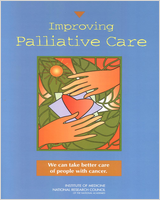“I didn't know where to get the information I needed to make good choices for my care. It was really hard to understand what my options were. I really needed it broken down for me.”
Jesse, 62
When people find out they have cancer, they often look for information about what caused their cancer, what treatment choices they have and what is going on in research. People can get this information from many places:
- Health professionals
- Family and friends
- Cancer support groups
- Religious leaders
- Printed materials
- Telephone hotlines
- The Internet
Most materials focus on curing cancer and living as a survivor. There needs to be more information provided about palliative and end-of-life care. Booklets and other written materials must describe palliative care and the last stages of cancer, as well as treatment and prevention. These materials must also be written at appropriate reading levels and in the languages that people feel most comfortable reading.
People rely on their health care providers for information about end-of-life care. But everyone, health care providers included, finds it hard to talk about death and dying. Health care providers must be trained and given the experience they need to sensitively talk about end-of-life care—and to listen to patients and families, in turn. Both health care providers and families need help in finding acceptable ways to talk about end-of-life care.
- People need help in finding out about palliative care and end-of-life care. - Im...People need help in finding out about palliative care and end-of-life care. - Improving Palliative Care
Your browsing activity is empty.
Activity recording is turned off.
See more...
